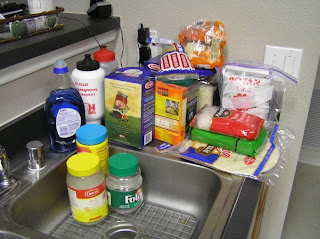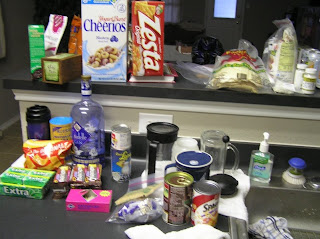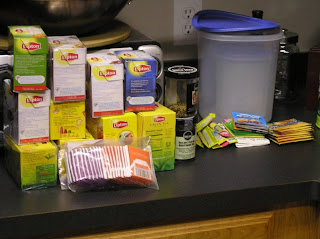As Americans, we are quick to be desensitized to things, thanks in part, to the media. When all you hear every day on the news is how shitty the economy is, and how the "housing bubble" has burst, and bad times are in store for everyone, you begin to worry somewhat. Then after several weeks of it being the top story in every media outlet, it becomes old news, and you start to not care about it at all.
First there was the housing bubble, then banks started to dive, then the stock market reacted and took a shit, and all the while, gas prices were climbing at an alarming rate. It is a never ending cycle. Anyway, my point is that these are uncertain times. No, the world is not coming apart at the seams, and no, all hell is not going to break loose any time soon. When I refer to uncertain times, I refer to American sentiment towards itself essentially.
As the media begins to scare people about the next thing that is likely to kill you or cause you some sort of inconvenience, I think this is a good time to make sure that you are "protected" for lack of a better term.
You have probably read my past articles about having your paperwork squared away in case you get killed or die suddenly, and I also did one about buying a few choice weapons, just in case there is civil unrest, but today we are focusing on food. It might be a swell idea to get your pantry in order. Yeah, yeah, I know, that's quite a leap from media fear mongering to organizing your pantry, but somehow in my head, one lead to the other, so deal with it.
I have been meaning to square away a well stocked and organized pantry for a few weeks now, but when I heard the media trying to scare people into thinking there is going to be some sort of martial law food rationing scenario, I figured this would be a good time to make it happen.
In case you have not been keeping score, the latest media blitz seems to be focused on the magical "rice shortage" and subsequent "rationing". First of all, there is no rice shortage. The earth contains plenty of rice. So Joe Blow, sitting at home on his couch picking his ass, watching the news, hears about the world wide rice woes, and suddenly decides he better get in while he can, and buys 300 pounds of rice. For fuck's sake, tomorrow rice may no longer exist. Sure, he didn't seem to want any rice yesterday, but now he needs a shitload of it in case it goes away forever.
I eat rice regularly. I love it. So, when I started thinking about Joe Dipshit chillin' out watching "Two and a Half Men", and suddenly deciding he needs 300 pounds of Basmati goodness, I started thinking about my rice scenario. If all these doucheweeds go buy up all the rice from my local supermarket because FOX4 scared them, then it affects me negatively. So I go check out my pantry and discover that finding all my rice is difficult because the pantry is in such disarray. Time to defrag!
I would be willing to bet that at least 85% of the population in the USA is unhappy with their current pantry setup. I would also be willing to bet that it is pretty low on the priority list. and I know for a fact, that a well organized and defragmented pantry can increase overall kitchen productivity, and who knows, maybe even lead to a better sense of well being.
So this past Friday evening I took every single item out from my pantry. I then threw away all the crap that was out of date. I was running maybe 8-10% foodstuffs that were out of spec. I had a few items that were 10 years old! I also discovered empty boxes taking up space, items like an old coffee maker that was broken, a blender that I haven't had the bucket part for in over 5 years, and various large empty containers. Why did I have all this stuff? No idea.
I failed to take a picture of how the pantry looked before I started taking things out. I didn't even think about it being picture worthy until I had only two shelves cleaned, and realized how much junk I had laying out on the kitchen counters. Here is how the pantry looked after 2 shelves cleaned.

And here is a few shots of all the junk that was on those shelves.





Next we have a shot of the pantry after full removal.

So I was shocked to discover that after putting everything back in, that I only needed maybe 35% of the space. I suppose I could have tried to put everything on a single shelf, but it seemed to be better logistically to have everything separated out, so I made a section for medicines, a section for drinks, etc...
Here are a few shots of the stuff back in the pantry. As you can see, I have an abundance of free space now.



So defragging the pantry made me realize a couple of things. 1 - I have plenty of free space for stuff in the pantry, and 2 - there is a lot of wasted space in the pantry. My plan for #1 is to fill some of the space with some emergency reserve food. This will consist of a few 5 gallon containers of dry staple foods. Rice, beans, corn, etc... and a couple of containers of clean backup usable water. For #2, I am going to make a trip to the container store to pickup a few organizational hardwares. A set of wire shelves to attach to the back of the pantry door, undershelf hanging containers, and a few tri-level shelves should maximize pantry potential without breaking the bank. From a quick look around Home Depot, it looks like these little things only cost a few bucks each, so no big deal there.
Everyone should take a few quick minutes to look at their pantry and ask themselves if they are happy with its current status. Most people won't be, but it literally only takes a few minutes to take care of it, half an hour at the most. If Joe Asshole would get off his couch and away from "How I Met your Mother" for a few minutes go look in the pantry, he might discover that he already has plenty of rice buried under his cup cakes and Twinkies.
*I will document the dry food storage activities when I begin getting that in order.
So what have we learned today?
1. The media sucks
2. There are a lot of crappy shows on TV
3. There is plenty of rice
4. Your pantry is retarded
5. Did we win the war daddy? What is Vietnam?